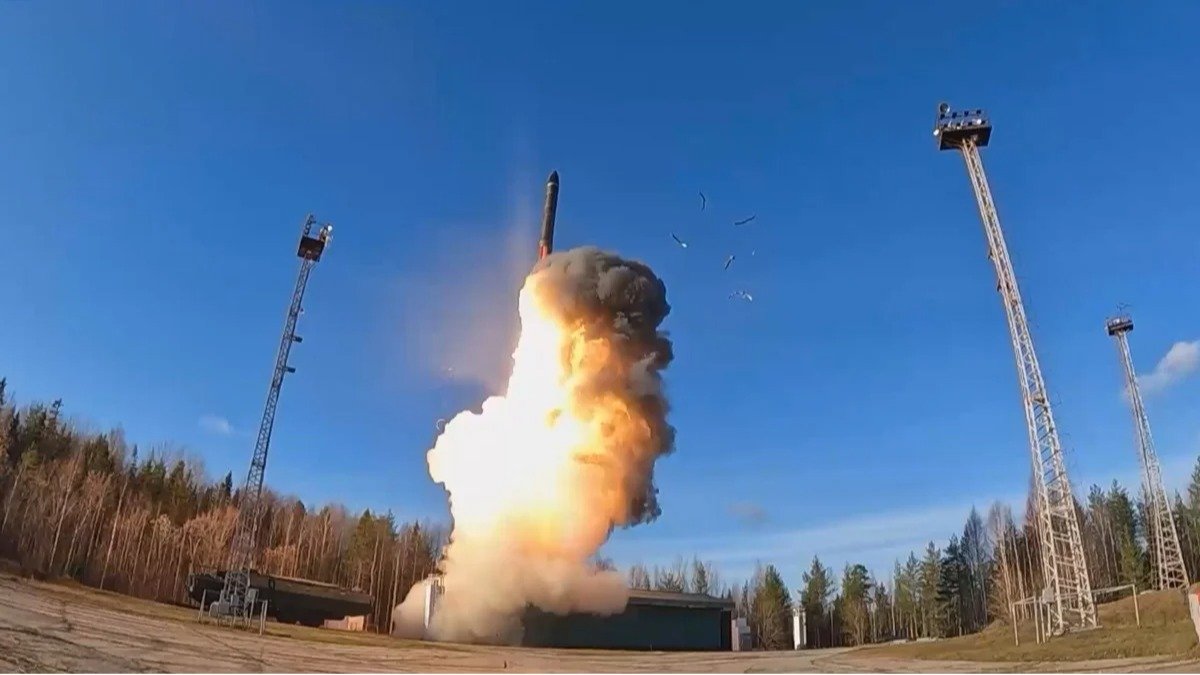In the wake of recent escalating rhetoric between Washington and Moscow surrounding a return to nuclear testing, Novaya Gazeta Europa spoke to leading experts about what this might mean in practice. Should we really expect a return and if so, what could it lead to?
This week saw Russian Defence Minister Andrey Belousov formally suggest to Vladimir Putin that immediate preparations be made for the full scale testing of nuclear weapons on the Novaya Zemlya archipelago in Russia’s far north. Putin responded by instructing Belousov to “examine the advisability of commencing preparations for such tests”.
Should we expect nuclear tests?
Post-Soviet Russia has never conducted a nuclear test, with the last Soviet era test occurring in 1990. Russian journalist Farida Rustamova believes that, for now at least, the Kremlin will refrain from any resumption, and that these latest statements should really be interpreted as a warning to US President Donald Trump to “mind his language”.
A Russian foreign and defence policy expert posits that any resumption of testing might actually represent an attempt to halt tensions rising even further as part of an “escalate to de-escalate” strategy.
Russian sabre-rattling when it comes to nuclear testing is nothing new. Maxim Starchak, an expert on Russian nuclear policy, points out that as recently as 2023, Putin instructed the Defence Ministry and Russia’s atomic energy agency Rosatom to be ready for new tests. “Today the minister confirmed that we need to be ready, but this is probably a political move as nuclear testing falls within Rosatom’s remit,” Starchak said, ”Belousov wants to show that he favours a rapid response to any American tests.”
Not all experts completely rule out new Russian tests, however. Pavel Luzin, a Russian foreign and defence policy expert, posits that any resumption of testing might actually represent an attempt to halt tensions rising even further as part of an “escalate to de-escalate” strategy in which it would be necessary “for Russia to display its readiness and willingness to use nuclear weapons”.
Luzin admits that testing itself might be quite far off, with the immediate goal of the current rhetoric being to apply “psychological pressure on the West”. Announcing Russia’s preparations for renewed testing only represents a “half step” towards any actual tests taking place in the near future, he adds.
Is Russia ready for nuclear tests?
Russia currently has just one nuclear test site — that on the Arctic Ocean archipelago of Novaya Zemlya. Despite the last test taking place there in 1990, it has continually been maintained since then in readiness for any future tests. Russia has an advantage, Starchak says, in that it has almost completely modernised its nuclear forces, something that the US is only just starting to do, and that nuclear tests may be seen as necessary to check existing weapons as well as to test new ones.
“Techincally, existing weapons can be tested through scientific experiments as well as computer modelling, but some physicists have advocated for testing as a means to create new warheads. If Russia decides to take this step, it would involve moving beyond the boundaries of the existing New START Treaty”, Starchak said.
Starchak notes that ultimately, whether or not Russian nuclear tests come to pass may come down to the appetite of the US Republican Party to increase the country’s nuclear stockpiles.
The New START Treaty, which was signed in 2010 and ratified in 2011, limits the amount of strategic nuclear arms either the US or Russia can hold at any one time, although, crucially, it is due to expire in February.
Starchak notes that ultimately, whether or not Russian nuclear tests come to pass may come down to the appetite of the US Republican Party to increase the country’s nuclear stockpiles. If that did happen, Russia may feel obliged to respond in kind. Such a move would be costly and could mean “the development of some expensive missile systems would have to be abandoned in favour of the arms race.”
Starchak believes that any testing by either country would be limited “primarily to underground explosions” and would avoid the use of intercontinental ballistic missiles (ICBMs) altogether.
American tests
Luzin stresses that the US has also not carried out any nuclear tests in over 30 years, and so Russian rhetoric over its own potential resumption cannot be seen as a direct response to American activity. Instead, he argues it should be interpreted through the lens of “Russia trying to put pressure on the West because Russia’s situation has got worse, not improved, over the last year”.
Nevertheless, US President Donald Trump has followed through, in part at least, on his recent statements concerning the need for the US to carry out its own tests. In response to news that Russia had conducted tests of its nuclear-capable 9M730 Burevestnik and Poseidon weapons in October, Trump ordered the Pentagon to resume American testing “immediately”, citing the need for the US to respond to the fact that “other countries” were already doing so.
On Wednesday, the US did conduct a test launch of a nuclear-capable Minuteman III ICBM, although on this occasion no nuclear payload was attached. The missile successfully flew approximately 6,600 kilometres from its launch site at California’s Vandenberg Air Force Base to the Marshall Islands in the Pacific.
While it is hard to say where a resumption in nuclear testing might lead, Tilman Ruff, an honorary principal fellow at the University of Melbourne in Australia, commented recently that the Doomsday Clock — one of the most authoritative and best-known assessments of the existential threats facing the world — had moved further forward this year than it had ever done before, reflecting what an extraordinarily dangerous time in history this is.

